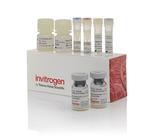Search Thermo Fisher Scientific
Invitrogen
Mouse TNF alpha ProQuantum Immunoassay Kit
FIGURE: 1 / 4
Mouse TNF alpha ProQuantum Immunoassay Kit
(A) Antibody-antigen binding: Antibodies bind to two separate epitopes on the antigen (during a 1-hr incubation), which brings the two conjugated oligonucleotides into close proximity. (B) Ligation and amplification of signal (in a qPCR instrument): DNA ligase and a third splint oligonucleotide connector are added to ligate the two ends of the conjugated oligonucleotides, creating a 100-base DNA template. Once the ligase is inactivated at 95°C, the sample is amplified through 40 cycles of annea... View More




Product Specifications
Analytical sensitivity
Assay range
Sample type/volume
Hands-on time
Time-to-result
Homogenous (no wash)
Instrument
Product size
Contents
Antibody-Conjugate A
Antibody-Conjugate B
Antibody-Conjugate Dilution Buffer
Standard
Master Mix
Ligase
Shipping conditions
Storage
Protein name
Species (tested)
Assay kit format
Label or dye
About This Kit
The ProQuantum Mouse TNF alpha Immunoassay Kit is designed to provide highly sensitive quantitative measurements of mouse TNF alpha in small sample volumes. Utilizing proximity-based amplification technology, the assay combines the analyte specificity of high-affinity antibody-antigen binding with the signal detection and amplification capabilities of real-time PCR to achieve a simple yet powerful next-generation protein quantitation platform. A user-friendly workflow combined with intuitive Cloud-based software for analytics enables sample-to-answer in just 2 hours.
• High sensitivity-detect low levels of protein with greater sensitivity than traditional methods
• Broad dynamic range-5 logarithmic units, minimizing sample dilutions to ensure they fall within the range
• Small sample consumption-use 2-5 µL of sample (compared to 75 µL for triplicate wells with other methods)
• Fast, easy workflow-2 hours from sample to answer, with no wash steps
• No proprietary instrument to purchase-runs on any real-time PCR instrument
ProQuantum immunoassays utilize a matched pair of target-specific antibodies, each conjugated to a DNA oligonucleotide. During antibody-analyte binding, the two DNA oligos are brought into close proximity, which allows for ligation of the two strands and subsequent creation of a template strand for amplification. This platform leverages the sensitivity and large dynamic range of Applied Biosystems TaqMan real-time PCR technology (Figure 1).
The assay workflow is fast and easy-2 steps in 2 hours. There are a total of 7 components in each kit (Figure 2). First, mix the antibody-conjugates, dilute the sample, and create the standard curve in a working plate. Then, using a multi-channel pipette, add the antibody-conjugates and sample (or standard) into the wells of a PCR plate and incubate for 1 hour. Combine the master mix and ligase and add to the wells of the PCR plate, then run the plate on any qPCR instrument. After the run is complete, import the results file into the ProQuantum cloud-based software at https://apps.thermofisher.com/apps/proquantum. Using this software, the data can be analyzed easily to obtain protein concentration values. The software allows you to set up standard curves, design plate layouts, set up customized assay instructions, and obtain robust statistical group-wise comparisons.
TNF alpha is a multifunctional proinflammatory cytokine that belongs to the tumor necrosis factor (TNF) superfamily. This cytokine is mainly secreted by macrophage and bind to its receptors, TNFRSF1A/TNFR1 and TNFRSF1B/TNFBR. TNF alpha is involved in the regulation of immune cells, cell proliferation, differentiation, apoptosis, lipid metabolism, and coagulation. TNF alpha exists as a multimer of two, three, or five noncovalently linked units, but shows a single 17 kDa band following SDS-PAGE under non-reducing conditions. Knockout studies in mice also suggested the neuroprotective function of TNF alpha, and has been observed to causes tumor necrosis when injected into tumor-bearing mice. Other functions of TNF-alpha include its role in the immune response to bacterial, viral, parasitic and certain fungal infections, as well as its role in the necrosis of specific tumors. TNF alpha causes cytolysis or cytostasis of certain transformed cells, being synergistic with interferon-gamma in its cytotoxicity. This cytokine has been implicated in a variety of diseases, including autoimmune diseases, insulin resistance, and cancer.
For Research Use Only. Not for use in diagnostic procedures. Not for resale without express authorization.
Bioinformatics
Gene aliases : DIF, Tnf, TNF-a, TNF-alpha, Tnfa, TNFalpha, Tnfsf1a, TNFSF2
Gene ID : (Mouse) 21926
Gene symbol : Tnf
Protein Aliases : Cachectin, TNF-a, TNF-alpha, Tumor necrosis factor, Tumor necrosis factor ligand superfamily member 2, tumor necrosis factor-alpha
UniProt ID (Mouse) P06804

Performance Guarantee
If an Invitrogen™ antibody doesn't perform as described on our website or datasheet,we'll replace the product at no cost to you, or provide you with a credit for a future purchase.*
Learn more
We're here to help
Get expert recommendations for common problems or connect directly with an on staff expert for technical assistance related to applications, equipment and general product use.
Contact tech support